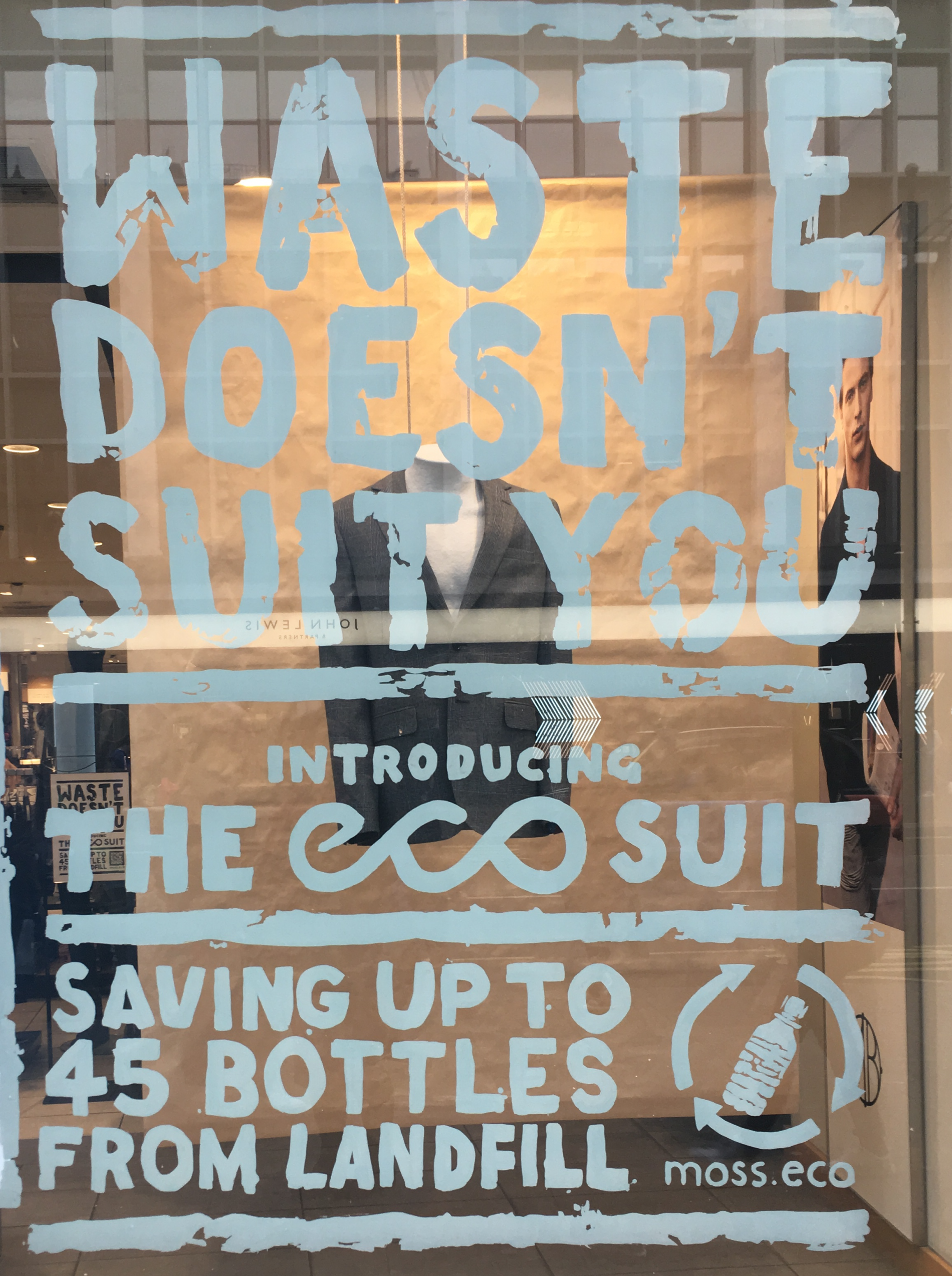Innovation & Trends
Monthly News Roundup 1.3
1. Moss Bros introduce the Eco Suit
Moss Bros, the £130m UK menswear retailer, has joined the sustainability party with the launch of its Eco Suit. Riding the wave of increased concern from customers about plastic, aka the “David Attenborough effect”, the suit’s polyester fabric is made from recycled plastic bottles. The lining, shoulderpads and thread are made from recycled polyester and the buttons from corozo nuts.
The suit’s launch has been accompanied by some strong customer facing communication, including a dedicated microsite with imagery linking the suit and beaches and plastic pollution. The communications don’t just raise the issue of ocean plastic though, they also share considerable detail about every component of the suit and its packaging, both online and on shopfronts (they have 150 stores in the UK).

Such communication is a bold move on just one suit for a retailer that sells over 200 suit styles and over 300 shirts, none of which have similar eco-claims at the present time. Moss Bros acknowledge this “a long way to go, but every step is one step closer” and highlight overarching commitments to work with suppliers to develop more responsible processes and materials. No specific targets are given though which is disappointing.
Other interesting product launches this month included Reformation’s partnership with New Balance on sustainable sneakers; Napijiri’s 100% recyclable jacket, and Sheep Inc’s sweater which is carbon negative and comes with a sheep (and some very clever branding).
Take action
Get started on creating a sustainability roadmap including tools to help you define your objectives and targets. Find out more about how to source ethical suppliers and use our handy Fabric Switch guides to find suppliers of more sustainable alternatives to polyester, viscose, cotton and more.
Inspired by Sheep Inc’s clever comms? See more of the top trends in sustainability art direction this year from the most inspiring brand imagery trendsused by organisations and brands to communicate their sustainability story to impactful typography and copywriting.
2. Adidas launch ‘take-back’ scheme in UK
Adidas were clearly ahead of the curve when they first started a ‘take back and recycle’ scheme in Brazil in 2012, followed by pilots in Canada and then limited stores in New York, Paris and London in 2017. Now the German sportswear brand has launched in the UK with plans to roll out globally next year.
Adidas will take back Adidas product, which will then be repaired, resold or recycled, in return for customers signing up to a loyalty programme giving them vouchers to spend in store or online.
Like other similar schemes (H&M, M&S, Zara all have similar take-back schemes and John Lewis has also recently announced they will be trialling one this year) whilst it helps overcome one of the challenges of moving to a more circular fashion economy, namely the collection for reprocessing of used clothing, the use of vouchers encourages more purchasing of new clothes and footwear (80% of customers returning clothing use their vouchers to buy new from the same brand according to one report) thus adding to the volume already in existence and the impact of production of new clothing.
Take action
Learn more about the Circular Fashion Economy, the volume of clothing produced and the impact of waste in the fashion industry.
Most clothing, even when it is collected, cannot easily be recycled. Find out more about how to Design for Sustainability in the first place. And be inspired by design led businesses that are reworking old clothes into new
3. Civil society organisations call for legislation on human rights and environmental due diligence
Over 80 non-governmental organisations and trade unions, including Oxfam, Action Aid, Fairtrade, Terre des Hommes, Brot fur die Welt and the National Garment Workers Federation have called on the European Union (EU) to create effective legislation to establish a mandatory human rights and environmental framework for businesses operating from, or selling a product in, the EU.
They argue that decades of voluntary “corporate social responsibility” initiatives have failed to adequately protect human rights (which include worker rights) and the environment and that the absence of laws requiring companies to identify, prevent, mitigate and account for human rights abuses and environmental damage make it impossible for them to be held legally responsible when they neglect their responsibility.
At a time when an increasing number of fashion brands are upping their game with regard to environmental sustainability and using more sustainable fabrics, this is a timely call for a level playing field and to ensure that the impact on people as well as planet is included in corporate practice.
Take action
Be prepared for any upcoming legislation through partnering with existing initiatives, standards and trade unions. See our updated Fixing Fashion: Who Is Doing What? report for more information. Modern slavery legislation already exists - read our snapshot overview.
Move forward with improving human rights in the form of worker rights. There are useful tools for ensuring a living wage and take practical steps to ensure that buying practices don’t undermine them.
In other sustainability and fashion news
Sustainable packaging
Finisterre switches to marine-safe bags made from Aquapak polymer
Sustainability reports
Filthy Fashion: new scorecard ranks which brands are leading, and lagging, on climate
Sustainable material innovations
Birla launch viscose made from recycled cotton waste
Spinnova and Fortnum present clothing made from straw
Leather from cacti exhibited for the first time (watch video - in Spanish)
Sustainable fashion industry events
Textile Exchange held their 2019 Conference in Vancouver
